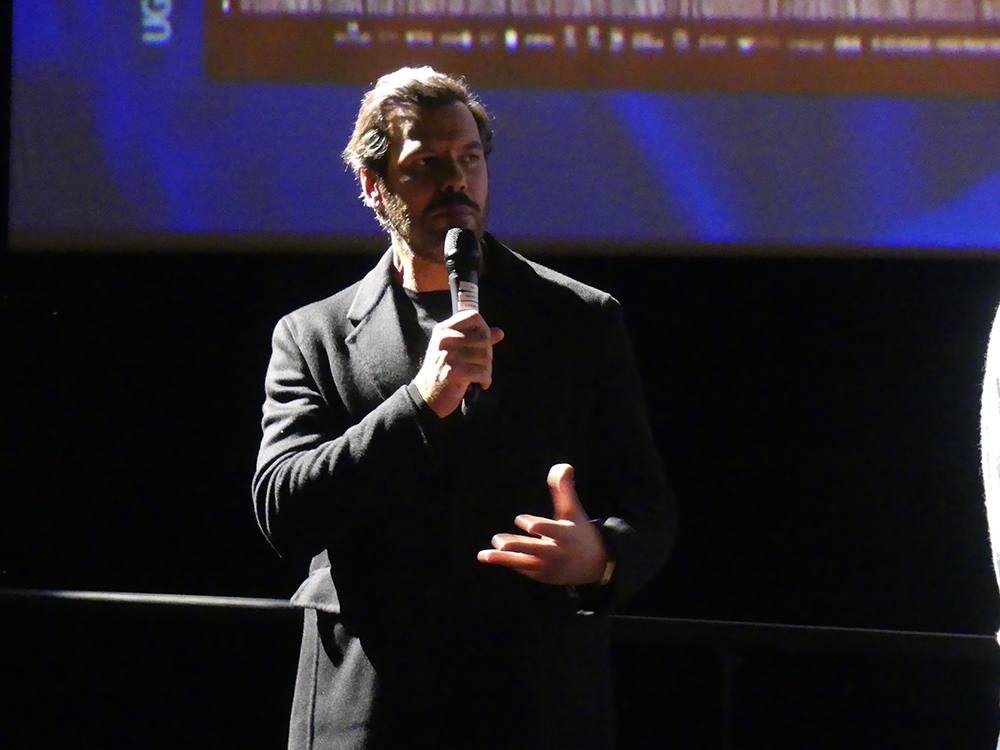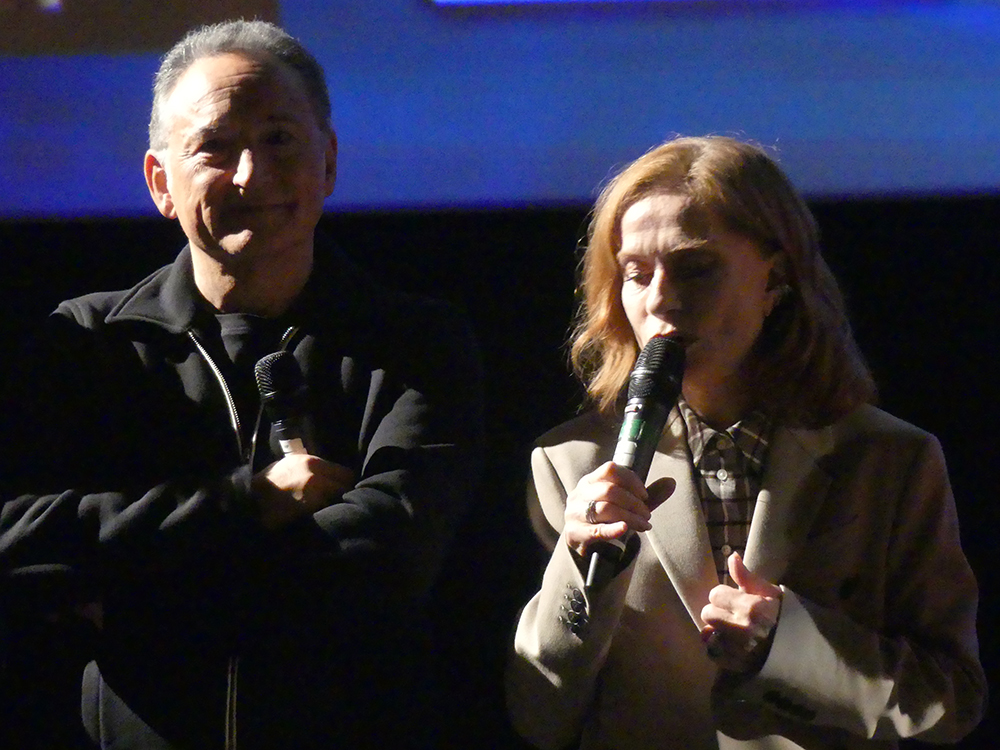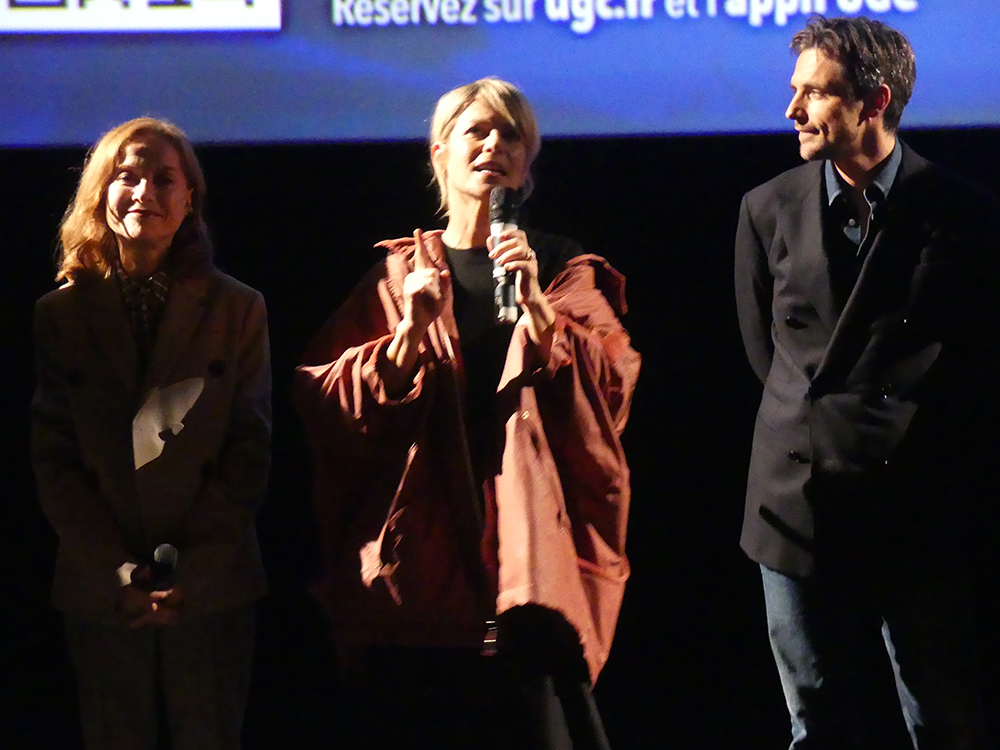Premiere - The Richest Woman in the World : A Parisian Premiere of Elegance, Power, and Secrets
By Mulder, Paris, UGC Ciné Cité Les Halles, 21 october 2025

The Paris premiere of The Richest Woman in the World took place on October 21, 2025, at UGC Ciné Cité Les Halles, theater 10, in the presence of director and co-screenwriter Thierry Klifa, co-writers Cédric Anger and Jacques Fieschi, and the main cast, including Isabelle Huppert, Laurent Lafitte, Marina Foïs, and Raphaël Personnaz. The atmosphere was one of quiet luxury mixed with lively anticipation, marking an event that blended Parisian sophistication with cinematic prestige. The film, which had already been praised during its presentation at the Cannes Film Festival earlier that year, once again captivated audiences with its mix of elegance, intrigue, and emotional subtlety. Guests gathered not only for the glamour of the evening but also to witness Thierry Klifa’s deep and modern exploration of wealth, legacy, and emotional survival within a world of silence and privilege.
The Richest Woman in the World is inspired by the Bettencourt affair but stands as a fictional creation, a free and layered interpretation of the themes of power, inheritance, and human vulnerability. Rather than revisiting a scandal, Thierry Klifa uses the story as a lens through which to observe human nature — the contradictions of wealth, the fragility of affection, and the moral ambiguity that arises when money and desire collide. Together with Cédric Anger and Jacques Fieschi, he constructs a script that flows between irony and melancholy, where humor acts as a tool to reveal emotional truths. The film avoids judgment, preferring instead to study its characters with precision and compassion, offering a subtle commentary on how privilege distorts both love and perception.

At the heart of the story stands Isabelle Huppert as Marianne Farrère, a woman of immense fortune and hidden fragility. Her performance combines mastery and restraint, giving life to a character torn between control and yearning. Each gesture, each silence, becomes a reflection of her loneliness. The costumes designed by Jürgen Doering and Laure Villemer serve as silent narrators, representing Marianne’s many layers of self-protection and pride. Behind the elegance of her appearance lies the emotional isolation of a woman who commands everything but cannot command love. Isabelle Huppert embodies this tension with nuance, creating a heroine both magnetic and tragic — a symbol of power stripped of intimacy.
Opposite her, Laurent Lafitte brings a magnetic energy as Pierre-Alain Fantin, a photographer whose charm, audacity, and provocations disrupt Marianne’s carefully structured world. His character embodies the chaos that invades order, the rebellion that mocks decorum. Exuberant yet sincere, he becomes both catalyst and mirror, forcing Marianne to confront her emotional emptiness. The nightclub sequence, accompanied by a song performed by Anne Brochet and composed by Alex Beaupain, is one of the film’s most striking moments. It represents the meeting of two universes — wealth and vitality, repression and freedom — in a fleeting moment of joy that exposes the human beneath the mask.

Marina Foïs, as Frédérique, Marianne’s daughter, offers a deeply layered portrayal of a woman trapped by lineage. She embodies the fragility of inherited wealth — a woman who maintains appearances while suffocating beneath them. Her performance reveals how duty, reputation, and emotional neglect intertwine. Frédérique’s character carries the burden of an entire family history, marked by both privilege and moral decay. She personifies a generation that clings to tradition while yearning for release, and through her, the film examines the unspoken violence that often exists between mothers and daughters — a legacy of love that was never learned.
As the family’s silent observer, Raphaël Personnaz plays the butler, a man defined by loyalty yet destroyed by the world he serves. His restrained performance embodies dignity amid exploitation. His character becomes a lens through which the audience sees the machinery of class and hypocrisy: devotion punished, integrity turned into exile. His relationship with Laurent Lafitte’s flamboyant photographer highlights the blurred boundary between servitude and rebellion, showing how those on the margins of power often carry the deepest understanding of it.

The visual approach of Thierry Klifa, enhanced by the cinematography of Hichame Alaouié, establishes a quiet grandeur that perfectly suits the film’s themes. Each frame is elegant but never ostentatious. The interiors, designed by Eve Martin, breathe wealth without excess, suggesting a world that hides its decadence behind taste. The use of black screens between scenes adds rhythm and reflection, structuring the narrative like fragments of memory and public perception. These stylistic choices reinforce the dual nature of the film — both intimate and universal, glamorous and tragic.
The Parisian audience’s reaction mirrored that of Cannes: fascination followed by silence. The laughter that accompanied Laurent Lafitte’s sharp humor faded as the final scene unfolded — Marianne, alone on a beach, looking at nothing and everything at once. It was a moment of rare stillness, where the glitter of wealth gave way to a haunting emptiness. This contrast between power and isolation defines the film’s essence. The Richest Woman in the World is not a moral fable but a human study — a reflection on the loneliness of privilege and the quiet despair hidden behind social masks.

Beyond the glamour of its premiere, Thierry Klifa’s film stands as one of his most accomplished works, balancing sharp social observation with emotional depth. Supported by a remarkable cast, from Isabelle Huppert’s commanding subtlety to Marina Foïs’s inner fracture, from Laurent Lafitte’s chaotic charisma to Raphaël Personnaz’s quiet dignity, the film transforms a tale of power into a meditation on identity and loss. Elegant, unsettling, and timeless, The Richest Woman in the World reminds us that true wealth lies not in possession, but in the rare moments when truth briefly pierces illusion.
You can discover our photos in our Flickr page
Synopsis :
The richest woman in the world: her beauty, her intelligence, her power. A writer and photographer: his ambition, his insolence, his madness. Love at first sight sweeps them off their feet. A distrustful heiress who fights to be loved. A watchful butler who knows more than he lets on. Family secrets. Astronomical donations. A war where anything goes.
The Richest Woman in the World
Directed by Thierry Klifa
Produced by Mathias Rubin
Written by Cédric Anger, Jacques Fieschi et Thierry Klifa
Starring Isabelle Huppert, Laurent Lafitte , Marina Foïs , Raphaël Personnaz , André Marcon , Mathieu Demy , Joseph Olivennes , Micha Lescot , Paul Beaurepaire , Yannick Renier , Anne Brochet , Douglas Grauwels
Music by Alex Beaupain
Cinematography : Hichame Alaouié
Edited by Chantal Hymans
Production companies : Recifilms, Versus Production
Distributed by Hauit et Court (France)
Release date : May 18, 2025 (festival de Cannes) October 29, 2025 (France)
Running time : 123 minutes
Photos & video : Boris Colletier / Mulderville

